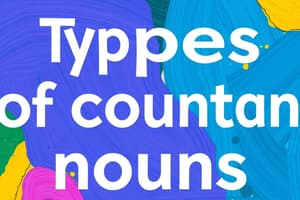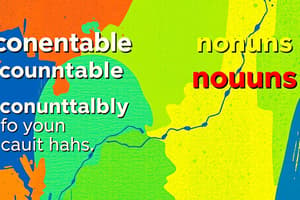Podcast
Questions and Answers
What is the main difference between countable and uncountable nouns?
What is the main difference between countable and uncountable nouns?
- Countable nouns are liquids, while uncountable nouns are solids.
- Countable nouns are always plural, while uncountable nouns are always singular.
- Countable nouns can be counted individually, while uncountable nouns cannot. (correct)
- Countable nouns are always concrete, while uncountable nouns are always abstract.
Which of the following nouns is uncountable?
Which of the following nouns is uncountable?
- Book
- Flour (correct)
- Chair
- Bicycle
What is the correct quantifier to use with the noun 'honey'?
What is the correct quantifier to use with the noun 'honey'?
- Much (correct)
- Many
- A few
- Some
Can the noun 'apple' be used with the indefinite article 'a'?
Can the noun 'apple' be used with the indefinite article 'a'?
What is the correct verb form to use with the noun 'furniture'?
What is the correct verb form to use with the noun 'furniture'?
Which of the following sentences is grammatically correct?
Which of the following sentences is grammatically correct?
What is the correct pronoun to use to replace the noun 'sugar'?
What is the correct pronoun to use to replace the noun 'sugar'?
Which of the following nouns can be both countable and uncountable?
Which of the following nouns can be both countable and uncountable?
What is the correct quantifier to use with the noun 'trees'?
What is the correct quantifier to use with the noun 'trees'?
Which of the following sentences is grammatically correct?
Which of the following sentences is grammatically correct?
Flashcards are hidden until you start studying
Study Notes
Countable and Uncountable Nouns
- Countable nouns: can be counted individually, e.g., apple, book, cat
- Uncountable nouns: cannot be counted individually, considered a whole or a mass, e.g.,
- Liquids: milk, oil, water, juice
- Powders and grains: flour, sugar, salt, rice, wheat
- Mass nouns: equipment, furniture, food, hair
- Natural phenomena: fog, wind, lightning
- States of being: health, fatigue
- Emotions: joy, sorrow, happiness, anger
- Gases: air, steam, oxygen, nitrogen
Rules for Countable and Uncountable Nouns
- Countable nouns:
- Can be used with a/an
- Take a singular or plural verb form
- Can be replaced by a singular or plural pronoun
- Uncountable nouns:
- Cannot be used with a/an
- Take only a singular verb form
- Can be replaced by a singular pronoun
Quantifiers
- Many: used with countable nouns, e.g., many trees, many books
- Much: used with uncountable nouns, e.g., much sand, much water
- A lot of: used with both countable and uncountable nouns, e.g., a lot of books, a lot of water
- A few: used with countable nouns, e.g., a few trees, a few apples
- A little: used with uncountable nouns, e.g., a little sand, a little water
- Some: used with both countable and uncountable nouns, e.g., some books, some water
Studying That Suits You
Use AI to generate personalized quizzes and flashcards to suit your learning preferences.




